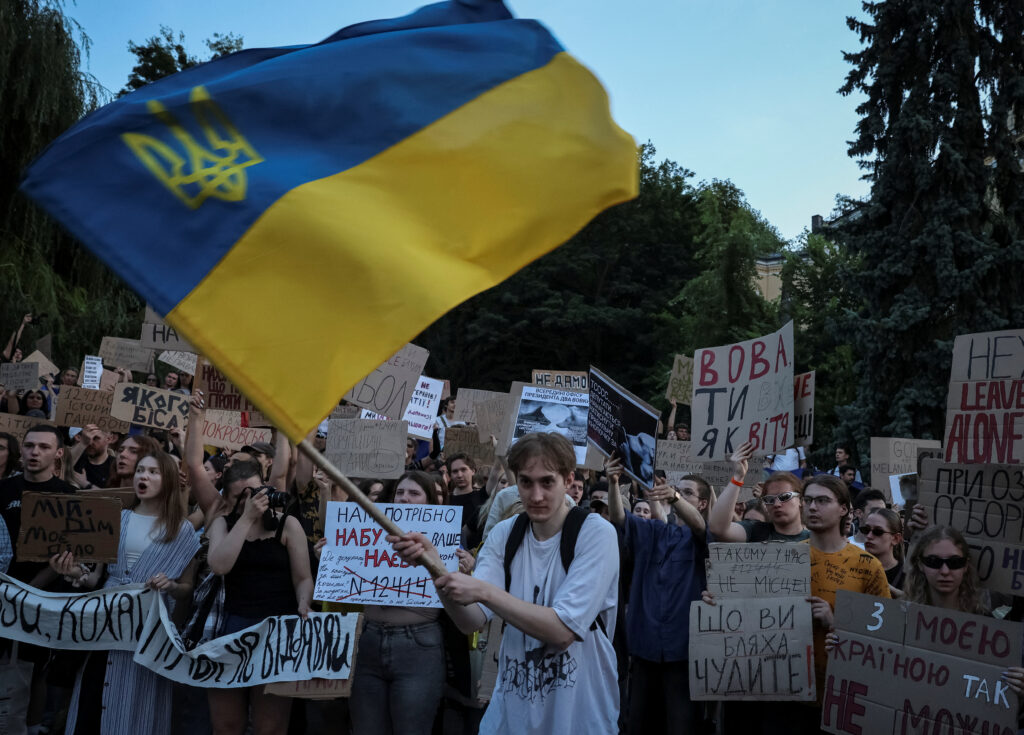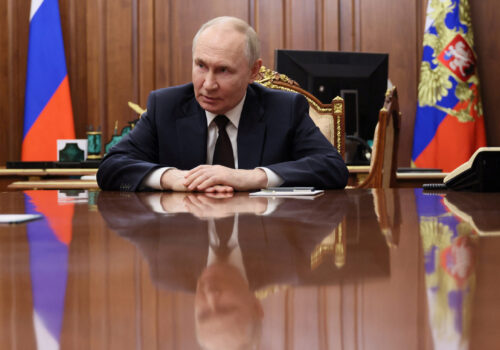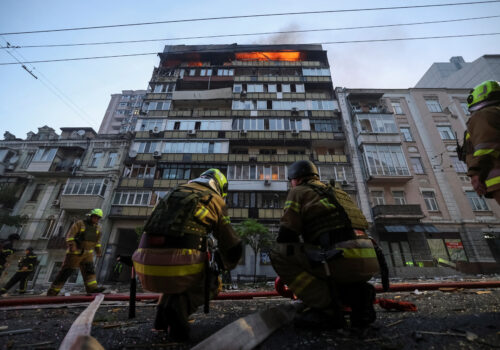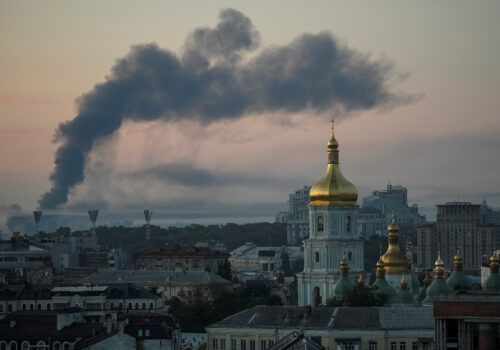Ukrainian President Volodymyr Zelenskyy appeared to reverse course on Thursday over plans to curb the powers of the country’s anti-corruption agencies following widespread international criticism and two days of public protests.
Thousands took to the streets in cities across Ukraine on Tuesday after parliament passed legislation limiting the independence of anti-graft agencies established following the 2014 Revolution of Dignity. The protests, which were the first to take place in the country since the start of Russia’s full-scale invasion more than three years ago, gained momentum on Wednesday.
In an apparent reversal of his initial position, Zelenskyy has now announced that he has approved a new draft bill restoring all powers to the country’s anti-corruption organizations and largely safeguarding their freedom to conduct investigations without government oversight. The new legislation has been submitted to the Ukrainian Parliament, with anti-corruption officials backing the government U-turn and urging swift passage of the bill next week.
There may yet be many more twists and turns in the scandal surrounding Ukraine’s anti-corruption agencies, but at this stage it certainly seems that the protesters have achieved a significant victory. Crucially, they have also highlighted the enduring strength of Ukraine’s democratic instincts and underlined the country’s continued commitment to basic freedoms at a time when the realities of war make elections impossible.
The Ukrainian authorities were unable to stage scheduled presidential and parliamentary elections in 2024 due to martial law restrictions and a wide range of security and logistical obstacles related to Russia’s ongoing invasion. With more than six million Ukrainians living as refugees in the EU and millions more currently under Russian occupation, a large percentage of the electorate would be unable to participate in any vote. Russia’s record of targeting Ukrainian civilians means that those who remain inside the country could not attend election campaign events or gather at polling stations in safety.
Despite widespread consensus among Ukraine’s opposition, civil society, and the country’s international partners over the practical barriers to organizing elections in wartime Ukraine, the Kremlin has sought to exploit the issue in order to question Zelenskyy’s legitimacy and brand him a dictator. Earlier this year, Russian President Vladimir Putin even floated the idea of placing Ukraine under temporary United Nations administration.
In reality, however, Putin is well aware of independent Ukraine’s strong democratic credentials. Indeed, it was the consolidation of the country’s fledgling democracy that helped persuade the Kremlin dictator to begin his military intervention in 2014, before convincing him of the need to launch his full-scale invasion eight years later.
Stay updated
As the world watches the Russian invasion of Ukraine unfold, UkraineAlert delivers the best Atlantic Council expert insight and analysis on Ukraine twice a week directly to your inbox.
Like millions of his fellow Russians, Putin has never come to terms with the loss of Ukraine and continues to view the country as part of Russia’s historical heartlands. He is therefore deeply hostile to independent Ukraine’s embrace of a democratic European identity, which he regards as an existential threat to his own increasingly authoritarian regime. The emergence of a democratic Ukraine is seen by Putin and other Kremlin leaders as a potential catalyst for the next phase in a Russian imperial retreat that began in the late twentieth century with the fall of the Berlin Wall and the collapse of the Soviet Empire.
Putin has been obsessed with the idea of extinguishing Ukrainian democracy ever since Ukraine’s 2004 Orange Revolution, which he personally helped spark by attempting to rig the country’s presidential election. In the immediate aftermath of the flawed vote, millions of Ukrainians flooded into Kyiv and succeeded in forcing a rerun, leading to the victory of opposition candidate Viktor Yushchenko.
This was to prove the breakthrough moment for Ukrainian democracy. Between the Orange Revolution and the start of Russia’s full-scale invasion almost eighteen years later, Ukraine held a total of eight presidential and parliamentary elections, all of which were rated free and fair by independent international observers. Meanwhile, Putin’s Russia continued to move steadily in the opposite direction.
Eurasia Center events

The Ukrainian population’s staunch defense of their democratic freedoms has consistently been a source of confrontation between Moscow and Kyiv. When pro-Kremlin Ukrainian politician Viktor Yanukovych was elected president in 2010 and attempted to reverse the country’s democratic gains, Ukrainians rose up once more and staged a second pro-democracy revolution. Within days of this successful uprising, Putin began the invasion of Ukraine with the seizure of Crimea.
For millions of Ukrainians, the country’s democratic choice remains one of the core values at stake in the current war. This sentiment has featured prominently during the present wave of protests, with many participants noting that Ukrainian soldiers are currently risking their lives for the freedoms that Zelenskyy himself appeared to be threatening with his undemocratic attack on the country’s anti-corruption agencies.
Former Ukrainian First Lady Kateryna Yushchenko, whose husband Viktor led the Orange Revolution, underlined the continuity between this week’s wartime protests and the country’s two pro-democracy revolutions of the post-Soviet era. “Ukrainians went to the streets today for the same reason they did in the 2004 Orange Revolution and the Revolution of Dignity. They want a European future, not a Russian one,” she commented.
Amid the horror and trauma of the largest European war since World War II, the readiness of so many ordinary Ukrainians to protest against threats to their hard-won freedoms speaks volumes about their determination to safeguard a democratic future. They understand that this is what so many of their compatriots are fighting for, and they are determined that these sacrifices will not be in vain. Indeed, it was striking to see many men and women in military uniform among the protesters. This is surely a sign of things to come in Ukrainian politics.
Putin has spent much of the past two decades attempting to corrupt Ukraine’s politicians and discredit the country’s democratic institutions, but he cannot convince the Ukrainian people to abandon the freedoms they have already tasted. This is why he is now so determined to erase Ukrainian statehood altogether. It is also a key reason why his invasion will likely end in failure.
Peter Dickinson is editor of the Atlantic Council’s UkraineAlert service.
Further reading
The views expressed in UkraineAlert are solely those of the authors and do not necessarily reflect the views of the Atlantic Council, its staff, or its supporters.

The Eurasia Center’s mission is to enhance transatlantic cooperation in promoting stability, democratic values, and prosperity in Eurasia, from Eastern Europe and Turkey in the West to the Caucasus, Russia, and Central Asia in the East.
Follow us on social media
and support our work
Image: Ukrainians protest in the first wartime rally against a newly passed law, which curbs independence of anti-corruption institutions, amid Russia's attack on Ukraine, in Kyiv, Ukraine July 24, 2025. REUTERS/Stringer





